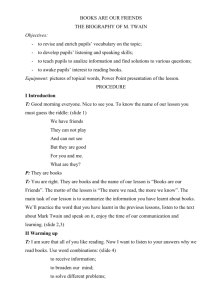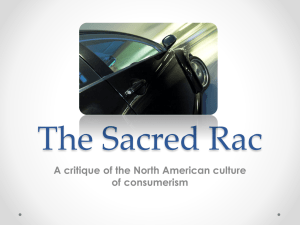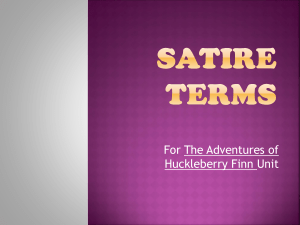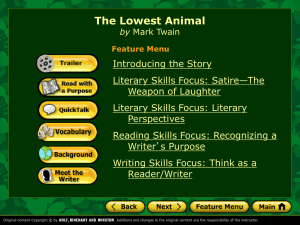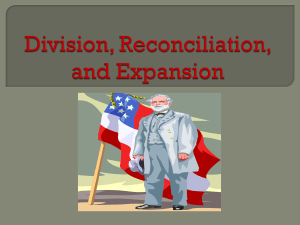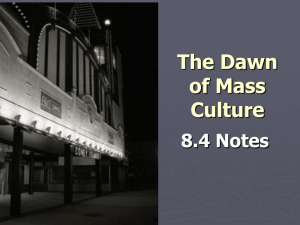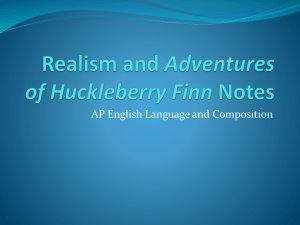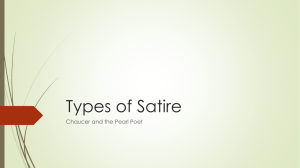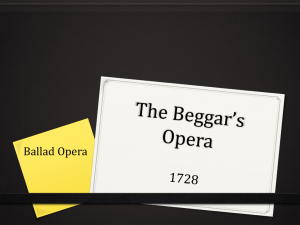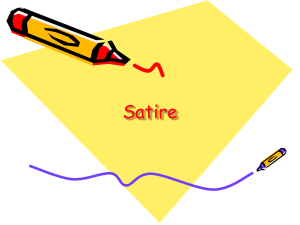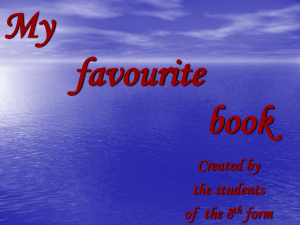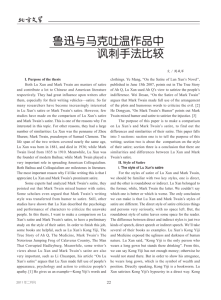like, as, than, or resembles
advertisement
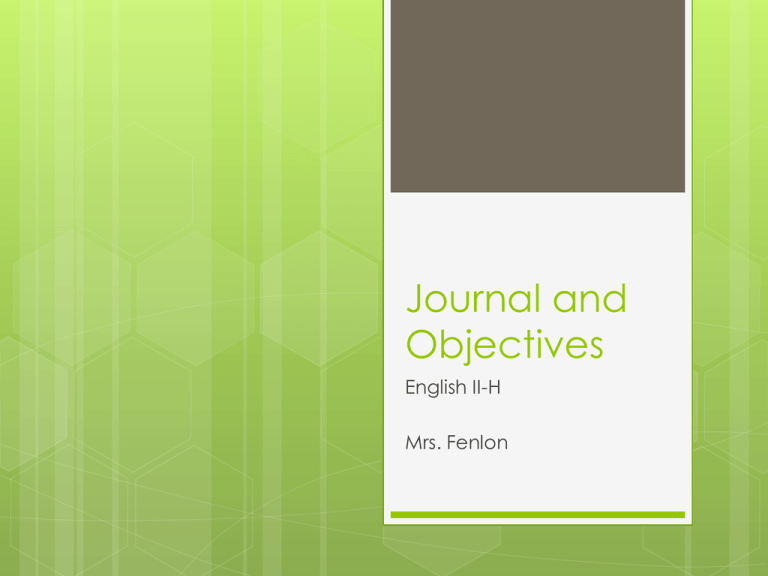
Journal and Objectives English II-H Mrs. Fenlon After viewing “Shift Happens” Reflect and respond to the following questions on paper: What modes of technology are you comfortable with? Write about a time when you used technology for any type of project and enjoyed it. Is there any type of technology that you are not comfortable with or do not enjoy using? Journal: September 10, 2010 “Laziness may appear attractive, but work gives satisfaction.”—Anne Frank What does the quotation mean? Relate it to yourself, society, history, pop culture, etc. Bildungsroman A novel about the moral/psychological growth of the main character Colloquial Informal Speech—slightly more formal than slang Foil A contrast to another character Diction A writer’s or speaker’s choice of words, which is appropriate to a specific audience. A statement or situation that seems to be a contradiction but reveals a truth Nonsequitir when one statement does not logically connect to the one it follows Satire A type of writing that ridicules something in order to reveal a weakness Epigram A witty, thoughtful statement Parody A literary work in which the style of an author or work is closely imitated for comic effect or in ridicule Idiom An expression that is often peculiar to a language that means something different from the literal meaning of a word Euphemism Substitution of a mild or less negative word or phrase for a harsh or blunt one Dialect A way of speaking that is characteristic of a particular group of people Epithet Adjective or descriptive phrase that is regularly used to characterize a person, place, or thing Adage A saying or proverb that embodies a certain amount of wisdom Allegory A narrative that serves as an extended metaphor Denotation The literal meaning of a word Aphorism Concise statement of a principle, truth, or sentiment Tone The attitude a writer takes toward the audience, a subject, or a character. Antihero A protagonist who is not on the side of “good” Connotation All the meanings, associations, or emotions that a word suggests Archetype Original pattern or model; a perfect example Allusion Reference to a person, place, or event from literature, history, religion, mythology, politics, sports, science, or pop culture Epiphany When a character suddenly experiences a deep realization about himself or herself; a truth which is grasped in an ordinary moment Hyperbole A figure of speech that uses exaggeration to express strong emotion or to create a comic effect; also called overstatement. Flat Character, Static Character, Dynamic Character A character who has only one or two traits; no depth A character who does not change much during the story A character who has many different character traits, which sometimes contradict each other Ellipsis Omission of words that is implied in a sentence—often by the use of three periods (…) Catharsis A cleansing of the spirit when feelings of pity and sorrow arise from tragedy Apostrophe Addressing of an absent person or inanimate object Begging the Question Also called Circular Reasoning; occurs when the believability of the evidence depends on the believability of the claim. Climax A moment of great intensity or suspense in the plot; usually marks the moment when the conflict is decided one way or another Simile A figure of speech that makes a comparison between two unlike things, using a word such as like, as, than, or resembles Pun Play on the multiple meanings of a word or on two words that sound alike but have different meanings. Syntax A word that simply refers to sentences and sentence structure Direct/Indirect Characterization Author reveals a character by stating directly what his/her personality is like Author reveals a character through his/her appearance, speech, inner thoughts and feelings, actions, or through the speech and/or thoughts of other characters. Logical, Ethical, and Emotional Appeals Attempting to win an argument by appealing to one’s sense of intellect Attempting to win an argument by appealing to one’s sense of fairness Attempting to win an argument by playing on the emotions of people 3rd limited point of view, 3rd omniscient, 1st person The narrator zooms in on the thoughts and feelings of just one character The person telling the story knows everything about the characters The narrator is usually a character telling the story using the pronoun “I”. Red Herring When a writer raises an irrelevant issue to draw attention away from the real issue Metaphor A figure of speech that makes a comparison between two unlike things without using the words like, as, than, or resembles. Foreshadowing Clues to events occurring later in the plot Oxymoron A combination of contradictory terms Local Color A detailed setting forth of the characteristics of a particular locality, enabling the reader to "see" the setting Picaresque Novel of or relating to a genre of usually satiric prose fiction originating in Spain and depicting in realistic, often humorous detail the adventures of a roguish hero of low social degree living by his or her wits in a corrupt society Situational Irony, Verbal Irony, Dramatic Irony A contradiction between what we expect to happen and what really does take place A writer or a speaker says one thing but means something entirely different The reader or audience knows something that the character in a play or story does not know September 13, 2010 “When luck enters, give him a seat.”Jewish Proverb Interpret the quotation—agree or disagree? Relate to self, society, history, etc. Essential Question: How does a writer’s use of wit and satire help reveal social injustices existing in our world? “Mark Twain: Our Original Superstar” Discussion Questions What is the difference between satire and irony? How would you describe the article’s overall tone? What is the overall/main point of the article? Journal: September 14, 2010 “An early morning walk is a blessing for the whole day.”—Henry David Thoreau Interpret the quotation: what does it mean? Do you agree or disagree? Relate to yourself, society, history, etc. Essential Question: How does a writer’s use of wit and satire help reveal social injustices existing in our world? Summary Pointers The article says that, “…” Punctuate titles correctly—short stories are enclosed in quotations, novels are italicized/underlined. Quote, cite, explain ALWAYS focus your summary on analyzing the main idea—don’t stray from the main idea! Replace dead words and weak verbs Work hard at building up to your final thought Sample Opening In Roy Blount Jr.’s article, “Mark Twain: Our Original Superstar,” he asserts that Mark Twain was the first who addressed social and political issues eloquently and humorously, thus paving the way for current political satirists such as “Jon Stewart, Stephen Colbert, Bill Maher, and Keith Olberman.” Sample Closing Each year, an award is given in honor of Twain, the Kennedy Center’s Mark Twain Prize for American Humor. Roy Blount, Jr. feels that Mark Twain’s essays are relevant even today; they still spark controversy, debate, and invite laughter. Sample Opening Statement In the article, “Mark Twain: Our Original Superstar,” Roy Blount Jr. describes Mark Twain as not only existing at the root of American literature, but also serves as the conscience of America during his time. Sample concluding thoughts Mark Twain is certainly a name America knows. He made America laugh in a time where it was needed most. He gave insight into societal issues and politics in a way no author had before. He is still considered the greatest author in American literature and is still looked up to as our “original superstar.” Unfamiliar Words—Newsweek Article Elusive Blithely Subversive Nihilism Clandestine Compulsion Polemic Droll Valedictory Punditry Unfamiliar Words—Time Article Adroitly Benighted Accolade Metastasizing Posthumous Fulminating September 15, 2010 “Love is a fruit in season at all times, and within the reach of every hand.”—Mother Teresa Interpret quotation, and agree or disagree. Relate to yourself, society, pop culture, history, etc. Essential Question: How does a writer’s use of wit and satire help reveal social injustices in our world? Satire What is the writer’s/cartoonist’s point of view on society? What is the writer’s/cartoonist’s target audience? In the novel, Twain includes… Satire on man to man cruelty Satire on religious hypocrisy Satire on the concept of slavery With your group, read your assigned section and figure out which of the three targets (listed above) Twain is satirizing. Be prepared to discuss Twain’s point of view on the issue as revealed through your assigned passage. Homework: Define Vocabulary, prepare for quiz Friday, and… Create a visual demonstrating one of satirical episodes of Huck Finn. Bring in your creation on Friday. Read “Advice to Youth” by Mark Twain for tomorrow and be prepared to discuss the main idea, as well as key points. (Highlight!)
